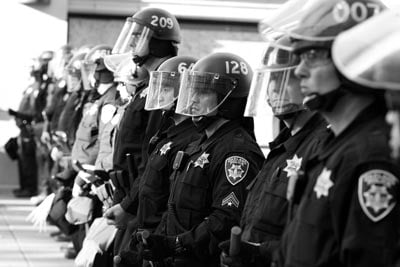Did you know that Truthout is a nonprofit and independently funded by readers like you? If you value what we do, please support our work with a donation.
 A line of police during the riots in Oakland, California, July 2010. (Photo: Thomas Hawk)In the wake of the killing of an unarmed man in California, we ask if US policing is becoming increasingly militarised.
A line of police during the riots in Oakland, California, July 2010. (Photo: Thomas Hawk)In the wake of the killing of an unarmed man in California, we ask if US policing is becoming increasingly militarised.
Extreme police tactics are not a new phenomenon in the US. But in the age of social media, police violence, such as the shooting of unarmed people and the use of pepper spray and taser guns, are being documented for the world to see.
Occupy protesters throughout the country felt the full force of police tactics – many were subject to violent arrest.
Perhaps the most controversial example was at the University of California, Davis (UC Davis) where peaceful protesters were pepper sprayed last November.
It is more than 20 years since a recording of police violence sparked riots in Los Angeles. The beating of Rodney King was caught on video and the footage shocked the world.
But two decades later how much has changed?
On Saturday, police in the Californian city of Anaheim shot and killed Manuel Diaz, an unarmed man who they said was running from them, hitting him in the leg and the back of the head.
Police said he and another young man shot dead the following day were both gang members. But local residents say the Latino men were victims of racial profiling and an overly aggressive police force.
The community reacted furiously and on Tuesday night, when protesters attempted to attend a city council meeting, they were barred from entering city hall by police who said the meeting room was full.
The protesters reacted by throwing rocks and bottles at the police and setting fire to bins. Hundreds of police in riot gear responded by firing non-lethal rounds at the crowd. At least six people were injured and police made two dozen arrests.
The clashes between protesters and police have now gone on for several days and nights. In one incident, police fired rubber bullets at near point blank range and police dogs attacked protesters. Mobile phone footage of the incident went viral, attracting nationwide attention.
Anaheim’s mayor says federal officials have agreed to investigate the shootings. But the city, where there have been six fatal police shootings this year, is now being compared to a powder keg.
So is policing in the US becoming increasingly militarised?
To discuss this, Inside Story Americas, with presenter Shihab Rattansi, is joined by guests: Jumana Musa, a human rights lawyer who is deputy director of the Rights Working Group; Gustavo Arellano, the editor of the OC Weekly, a newspaper that has been covering the shootings; and Raymond Lewis, a retired Philadelphia police captain who was arrested by New York police while taking part in the Occupy Wall Street protests last year.
Press freedom is under attack
As Trump cracks down on political speech, independent media is increasingly necessary.
Truthout produces reporting you won’t see in the mainstream: journalism from the frontlines of global conflict, interviews with grassroots movement leaders, high-quality legal analysis and more.
Our work is possible thanks to reader support. Help Truthout catalyze change and social justice — make a tax-deductible monthly or one-time donation today.